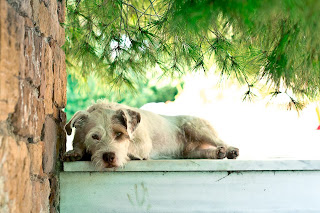However, while on the surface you see a group of cute animals relaxing, there lurks a deeper problem underneath. Most of these animals are condemned to a life on the streets – constantly scavenging for food, and often suffering from starvation or disease. When a stray is injured, it has no one to look after it, meaning it may spend the rest of its life with a broken or infected leg, or suffer a painful death as a consequence of the injury.
Tragically, it isn’t uncommon for us to come across unwanted kittens and puppies dumped in litter bins, scared and left to die.
What can we do?
The good news is that the stray problem can be dealt with effectively, with simple neutering programmes. By stopping the stray population from spiralling out of the control, over time the number of strays on the streets is greatly reduced. This mean fewer animals living on the streets, struggling to find food. It also takes the strain off undernourished mothers, who are too weak to care for large numbers of offspring. Neutering also causes males to become less aggressive and less likely to get into fights with other animals, which could lead to injury.
 |
| Happy and neutered |
GAWF helps in two ways:
• Organising neutering programmes – we work to neuter strays in specific areas, after which they are released back into to the same area. This generally prevents new animals from colonising in the area and reproducing.
• Education – we work with the local communities, showing them how to look after strays and ensure that stray populations do not get out of control. We find that in areas where the community looks after the street animals, incidents of cruelty and poisoning are rare.
How can you help?
Your donations help fund the neutering programmes, and give us the resources we need to educate local communities. We work with friendly vets and have managed to get the cost of neutering right down to just £30. Your donations are vitally needed and together we can:
• Reduce illness in strays, by vaccinating them
• Prevent animals from starving, by controlling their populations
• Ease the strain on undernourished mothers, who are too weak to care for their offspring
• Reduce cruelty towards strays by educating local communities
• Treat injured, ill, or poisoned animals who would otherwise have no one to look after them.
Please donate today, and make a difference to the lives of these beautiful, innocent animals. Thank you. For more about our neutering programme click here.











